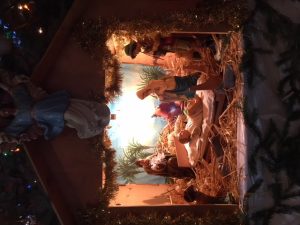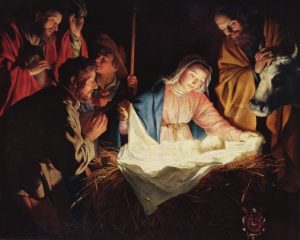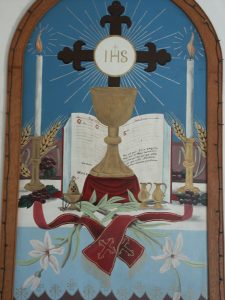Be Light For The World
(Isaiah 9:2-4, 6-7; Psalm 96; Titus 2:11-14; Luke 2:1-16)
*********************************************************
Fr. Rene Fumoleau OMI in the NWT recounts a trip by truck one night with an elder. The elder compared believing in God to driving a car at night. One sets out to a destination unable to see further than the distance illuminated by the headlights of the vehicle. That inability to see far does not hamper the journey because the light of the headlamps goes ahead of the vehicle and allows one to proceed in the darkness all the way to the destination. The elder mentioned that faith in God gives us just enough light to live another day.

The birth of Jesus into our world over two thousand years ago is similar to that story. Jesus brought light into our darkness, redeemed us from the power of that darkness, and transforms us into children of light for the world.
In the first reading, in that familiar and beautiful prophecy from Isaiah, we hear a succinct reference to a people that walked in darkness and lived in the shadow of deep darkness. He could have been speaking of our time. Our darkness today takes the form of war, corruption and greed in governments and financial institutions as well as our own families and communities, abuse of all kinds including sexual abuse, human trafficking of women and children, rape, gang violence and family breakdowns, racism and discrimination, rampant addictions not just to alcohol, drugs and gambling, but also to pornography and sex, and a rash of suicides and attempted suicides by young people. The list could go on. Needless to say, we also walk in darkness and we also live in the shadow of deep darkness.

Nativity Cole Bay 2017
Isaiah, however, also prophecies Good News: A child will be born among us who is Wonderful Counsellor, Almighty God, Eternal Father (and Mother)and Prince of Peace. This child will lift the yoke and the bar of darkness and evil, and break the rod of oppressive forces and systems. He will uphold justice, establish the kingdom of David and bring peace, joy and hope to all.
Isaiah’s prophecy reminds me of Dr. Martin Luther King who inspired thousands of people and indeed changed a nation and the world with his famous oration in the capital city of the United States entitled I Have A Dream. That dream, as powerful as it was, pales compared to the dream that God has for us and shares with us in the birth of Jesus, the Son of God, among us.
In the Gospel, we hear once again that familiar story of what we know and believe is the fulfillment of the prophecy of Isaiah in the birth of Jesus. The most striking note of this prophetic fulfillment, this birth, is the humble setting. Instead of Caesar, court, officials, Jerusalem and emperor, we have the child Jesus, shepherds, angels, Joseph and Mary. Instead of royal robes and thrones, we have a swaddling cloth and a manger, foreshadowing the burial cloth and the cross, his destiny of sacrificial death to reveal the depth of the God’s love for humanity.
The New Interpreters Bible offers an interesting reflection on this event. At Bethlehem we witness the scandal that God came into human history completely helpless, powerless, as a new-born child. He could have come in power and glory, but instead slipped almost unnoticed into a small province in a forgotten corner of the world to a poor young couple, engaged or only recently married. There were no elaborate preparations for this birth – our Creator God was born on the road.
The crib was a feeding trough, and those who came to visit were shepherds, not kings. By entering human history in this way, God identified with the powerless, the oppressed, the poor and the homeless. Among them, God could do divine work. A humility born of need is the prerequisite for entry into this new kingdom.

Adoration of the Shepherds, Gerard van Honthorst
The NIB continues to recount that the Christmas story tells the birth of a new king. Though the world was ruled by Caesar Augustus who was known as a peacemaker, real peace on earth would be realized only through the sovereignty of the child born in Bethlehem. His birth reveals a new world order, a world not under Caesar but under the direction of God’s design for the redemption of all peoples. In this world, God’s Word is heard by the humble. There is a place even for shepherds. There is hope for the poor and the oppressed, and those who heard what God was doing were filled with joy. God has not forgotten us nor abandoned us in the brokenness that we have created for ourselves. The story of Christmas is, therefore, both an announcement of hope, and a call to deep humility.
The second reading from Paul to Titus, unfolds for us the way that God worked through Jesus Christ and the impact this was meant to have on our lives. Paul is very clear: He it is who gave himself for us that he might redeem us from all iniquity and purify for himself a people of his own who are zealous for good deeds. Redeem and purify. Those are the key words. Jesus came into our wounded and broken world with a two-fold mission: to redeem or save, and to sanctify or make whole. It was not enough just to forgive us – he would also heal us.
The image that I like to use to understand this mystery more deeply is an experience I had as a university student when I slid far into a ditch in the winter snow with my car. I had to get a truck to pull me out, to redeem my car and save it from the ditch. Next, before I could start the car, I had to open the hood and remove all the snow packed around the motor, steering mechanism and fan belt especially. My car needed to be sanctified, purified, made road worthy. Then and only then was I able to drive away.

That is what God has done for us in Jesus whom he sent as redeemer and sanctifier, as savior and Lord. He has forgiven us, saved us, and wants to heal us, to sanctify us. As Paul put it in the second reading, our response must now be to let go of impiety and passions and live lives of self-control, uprightness, godliness, zealous for good deeds and loving service, waiting in hope and expectation.
Two questions that we can ask ourselves today are: 1) what ditch am I in, or what ditch am I getting out of? And 2) what shape am I in as I emerge from this ditch? In other words, 1) from what do I still need to be redeemed or forgiven, and 2) where do I still need healing in my life?
St. Paul would insist the time is now – there is no need to wait any longer. We must let Jesus be our savior and our Lord, and surrender our lives to him.
The Eucharist is a participation in that two-fold mission of Jesus. As we ponder the Word of God and receive the Body of Jesus, we are forgiven and sanctified, and sent out to bring to the world the light of Christ.

Eucharist Mural Waterhen First Nation
So, let us respond on this dark winter night, when we decorate our homes and Christmas trees, to the call to believe, to be forgiven and healed, and be ourselves a light to the world.




Finally the day has arrived when we have been waiting for the Light of world to be born. We have been waiting for the Lord saviour to be with us. We should decorate our homes , Christmas trees and churches to celebrate the dark winter night as we believe in Jesus as the Messiah. He is Christ the King that can change our lives and the entire world. Let us sing to the kingdom of God that we are delighted to receive this gift from God, the son of God and the son of David. He can overrule all good and evil in people, the government and in this world. We are to lift up our hearts and minds to receive The Baby Jesus who can melt our selves spiritually. I love you Jesus Christ. I Love You Jesus . Joy to the world , the Lord has come . Let us receive the King. Merry Christmas ! Season Greetings!
Thanks again for the speechless homilies with inspiring words, no words can express. You should be the light of the world. Thanks for sharing your stories and pictures. Your homilies can really make a difference in our lives , especially your teachings. Bishop Sylvain.Lavoie .